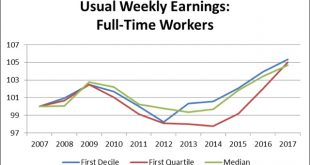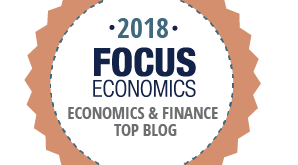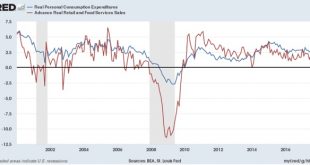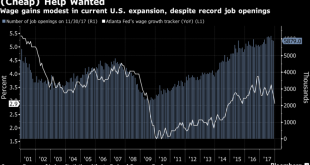About that Trump wage boom Over last weekend, I read a bunch of notes which indicated that Trump was claiming credit for a boom in wage growth. Let’s take a look: THIS is a wage boom: In the 1960s, real wages grew by almost 9% over 7 years, an average of 1.3% per year. THIS is also a wage boom: In the late 1990s, real wages grew by just over 9% in 7 years, again averaging 1.3% per year. This is NOT a wage boom: During the...
Read More »What’s behind the big Q4 decline in real median weekly wages?
What’s behind the big Q4 decline in real median weekly wages? [Note: This is a post I was working on last week. I hypothesized that the employment cost index would validate the analysis. Well, I didn’t get around to posting it, and the ECI came out this morning. So, how did I do? ] Last week the Bureau of Labor Statistics reported that real weekly median wages declined by over 2% in the 4th quarter of last year! This is quite the anomaly in the face of...
Read More »Lawrence Summers on Those Employee Bonuses – a Redux of the 1990’s?
Lawrence Summers on Those Employee Bonuses – a Redux of the 1990’s? Lawrence Summers made an interesting comments during a CNBC interview: Former Treasury Secretary and Obama administration economic advisor Larry Summers said Friday that recent employee bonuses are stunts and not reflective of long-term hopes for prosperity that tax cuts are supposed to bring. “I think it’s a gimmick,” Summers told CNBC’s “Squawk Alley.” “I think in many cases the firms...
Read More »Focus Economics top 101 economics blogs
Angry Bear maintains its status as one of FocusEconomics Top Economics and Finance Blogs of 2018. Econospeak is on the list as well, whose authors contribute to Angry Bear. Angry Bear The Angry Bear blog is a multi-author blog that covers news, politics and economics. The contributors to the blog are some of the best in the business such as emeritus professors, tax law experts, historians, business consultants, economics PhDs, finance professionals and...
Read More »Is the economy partying like it’s 1999?
Is the economy partying like it’s 1999 ? Suddenly I have a lot to say about the economy. My sense is that we are on to a new phase after the 2015 shallow oil-patch centered recession and 2016-17 rebound. The data has a feel to it of a late cycle blowoff. Let’s start with this morning’s personal income and spending. In the last 4 months, personal consumption expenditures, like retail sales, have taken off: Typically after mid-cycle personal...
Read More »CNN Explaining the current economy vs the Republicans version
I thought this was a nice brief on where the economy is and the lies of the republicans currently. Considering the show that will be put on tonight. [embedded content] Testing the White House Economic Claims
Read More »The Black Unemployment Rate
The Black Unemployment Rate Josh Marshall listens to Donald Trump so we do not have to: President Trump has been out bragging that “because of my policies” the African-American unemployment rate has dropped to its lowest level ever. This appears to be technically true. But I thought it made sense to give some context for the nonsensical nature of this claim. As you can see, the idea that this is “because of my policies” is a bit hard to square with the...
Read More »Is Treasury Secretary Mnuchin Right About The Impact Of The Dollar On US Trade?
Is Treasury Secretary Mnuchin Right About The Impact Of The Dollar On US Trade? Maybe yes. In Davos some days ago Treasury Secretary Mnuchin declared that a lower valued dollar would lead to a lower US trade deficit. The dollar promptly fell several percents and various persons and many observers reacted in horror, most prominently former TreasSec Larry Summers. He did no actually dispute Mnuchin’s claim factually, rather he asserted that people holding...
Read More »Perfect worker on the cheap
Via Bloomberg Obsession for the Perfect Worker Fading in Tight U.S. Job Market points to an issue in hiring that has been discussed here at AB: This is a problem because, at 4.1 percent last month, U.S. unemployment is at the lowest level since 2000 and companies from Dallas to Denver are struggling to find the right workers. In some cases this is constraining growth, the Federal Reserve reported last week. Corporate America’s search for an exact match is...
Read More »Parsing the Poland Problem Paradox: Local Versus National Outcomes
Parsing the Poland Problem Paradox: Local Versus National Outcomes As argued in numerous posts here, we have seen an apparently emerging disconnect between economic conditions and political outcomes in a variety of nations, with anti-immigrant or more generally nationalist or populist parties with authoritarian tendencies gaining strength in many nations despite apparently improving or even largely pretty good economic conditions. A list of those...
Read More » Heterodox
Heterodox





